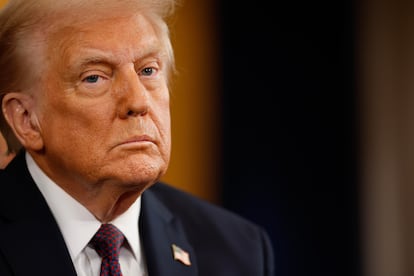Trump’s first immigration measures: Sending troops to the border and restricting citizenship
The Republican president announced dozens of executive orders on immigration. Requirements for obtaining residency are raised from five years to 14


Donald Trump began to shape his administration minutes after taking office. In his first speech as president, the Republican revealed some of the executive orders he promised for the first day of his second term. A dozen of these are intended to “repel the disastrous invasion of our country.” As announced in his campaign, the president is tightening the requirements to become an American citizen, is aiming to mobilize troops to the border with Mexico, to declare a national emergency to reduce illegal immigration, and will designate Mexican drug cartels and criminal gangs such as Tren de Aragua as terrorist organizations. These are just a handful of measures in an offensive described by the president as “the revolution of common sense.” Some of Trump’s announcements are expected to generate strong opposition and be taken through the courts, so they will not come into effect immediately.
Trump said anyone who enters the country illegally will be “immediately detained and deported.” “All illegal entry will immediately be halted and we will begin the process of returning millions and millions of criminal aliens back to the places from which they came,” said the president, who will end the policy known as Catch and Release, which allows immigration authorities to release a migrant in a community while their process is carried out in immigration courts. The announcement prompted a standing ovation from members of the Republican-dominated Congress present at the ceremony.
The president has revived legislation from 1798, enacted when the United States was on the verge of war with France. The four Federalist Party laws, collectively known as the Alien and Sedition Acts, toughen the treatment of foreigners in the United States. The requirements for obtaining residency would be raised from five years of living in the country to 14. The text also gives the executive branch full power to arrest and deport non-citizens. These laws were very unpopular when they came into force in the early 19th century and helped bring down the Federalist John Adams in the elections of 1800.
“Change begins today and it begins very quickly,” Trump said in his speech. The president intends to end the right to asylum for immigrants, one of the fundamental pillars of the United States and which had already been severely limited during the Biden administration. The Republican has also proposed pausing the relocation to U.S. soil of refugees or displaced persons due to international conflicts for four months. This began to be noticed in the very first moments of his administration: Some 20,000 migrants who followed their immigration process through the CBP One application saw the tool stop working on their cellphones. The president’s advisers have also not ruled out that, in the coming weeks, there will be an attempt to set up obstacles to the entry of some nationalities into the United States, a reissue of the controversial veto on Muslim countries in 2017.
The new Republican administration also wants to revive the controversial Remain in Mexico program, which affected 75,000 immigrants seeking to reach the United States and forced them to wait several months in Mexican territory while their cases moved through the courts. The program generated friction with the Mexican government during the first Trump administration. Tensions will surely resurface with the return of the controversial measure, which had come to an end under Biden in 2022.
This will not be the only flashpoint between Trump and his Mexican counterpart, Claudia Sheinbaum. The U.S. president has also issued an executive order to designate cartels as terrorist organizations, which is being interpreted in Mexico City as a measure that points to an eventual U.S. military intervention on Mexican soil. The executive order also triggers a series of federal laws that can be used by Washington to combat drug-trafficking criminal organizations on several fronts.
The 10 measures dedicated to the border will allow Trump to show a heavy hand in managing migration. However, the new government will receive the lowest numbers from the southern border in three years, when the coronavirus health emergency caused a collapse in irregular immigration. In December, fewer than 100,000 border crossings were recorded for the first time, something not seen since January 2021. Biden’s final six months in office also recorded a 70% drop in irregular crossings compared to the same period in 2023, according to the final figures from the Democratic mandate.
Sign up for our weekly newsletter to get more English-language news coverage from EL PAÍS USA Edition
Tu suscripción se está usando en otro dispositivo
¿Quieres añadir otro usuario a tu suscripción?
Si continúas leyendo en este dispositivo, no se podrá leer en el otro.
FlechaTu suscripción se está usando en otro dispositivo y solo puedes acceder a EL PAÍS desde un dispositivo a la vez.
Si quieres compartir tu cuenta, cambia tu suscripción a la modalidad Premium, así podrás añadir otro usuario. Cada uno accederá con su propia cuenta de email, lo que os permitirá personalizar vuestra experiencia en EL PAÍS.
¿Tienes una suscripción de empresa? Accede aquí para contratar más cuentas.
En el caso de no saber quién está usando tu cuenta, te recomendamos cambiar tu contraseña aquí.
Si decides continuar compartiendo tu cuenta, este mensaje se mostrará en tu dispositivo y en el de la otra persona que está usando tu cuenta de forma indefinida, afectando a tu experiencia de lectura. Puedes consultar aquí los términos y condiciones de la suscripción digital.








































